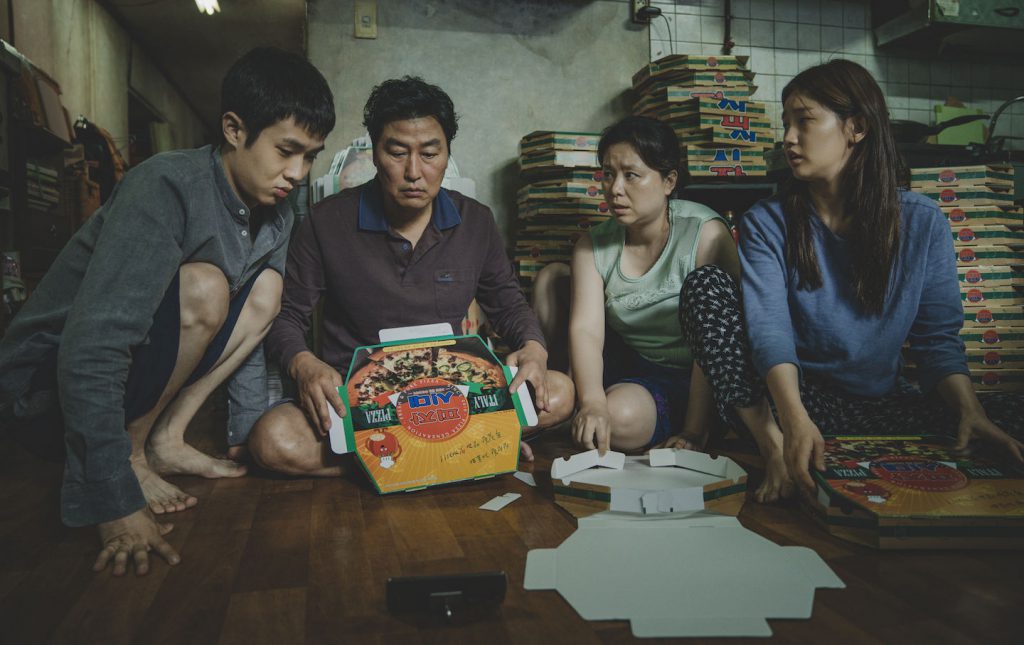
A still from Bong Joon-Ho's film “Parasite.“ Courtesy of Neon / CJ Entertainment
World-renowned chemist, linguist, and artist Sissel Tolaas established the SMELL RE_searchLab Berlin for smell & communication / language, where she has mapped several thousand different olfactory notes from across the globe. We greatly admire her visionary approach to dealing with social inequalities on a multisensorial basis. These approaches also stand at the core of the 13th Gwangju Biennale, with an emphasis on olfactory knowledge through Tolaas’s ongoing experience and research. On this occasion, we are making public her questions for Bong Joon-Ho, the acclaimed South Korean filmmaker who directed the thriller about class divide, Parasite(2019), which were intended to explore their mutual interest in smell as a form of emotional intelligence and way of reflecting on class divisions in late capitalist societies. Although Bong was unable to respond due to time constraints, we decided to nevertheless share Tolaas’s open questions.

A still from Bong Joon-Ho's film “Parasite.“ Courtesy of Neon / CJ Entertainment
Sissel Tolaas: A core element of the film Parasite is smell. Smell is one of the most intimate and private areas of human life. Why did you use smell to talk about class?
Bong Joon-Ho:
ST: Do you think heightened consciousness around smell could prove dangerous to the established social order?
BJ:
ST: The sense of smell has been marginalized because it threatens the abstract and impersonal regime of modernity by virtue of its radical interior, its boundary-transgressing propensities, and its affective potency. Smell is the most effective way to trigger people’s memory and emotions. Are these components important for your choice to integrate the sense of smell into the film?
BJ:
ST: Contemporary society demands that we distance ourselves from our emotions and that social structures and divisions be understood as objective or rational as opposed to emotional. How do you think smell could help overcome these prejudices?
BJ:
ST: Codes around smell continue to reinforce social hierarchies, often at a semi- or subconscious level, while sight, thought to be the most detached sense, provides the model for modern society. Do you think the future of filmmaking will implement more storytelling for all senses, to include the less dominant, more embodied or subtle, sensory intelligences?
BJ:
ST: While the status of sight is taken seriously, examinations of smell run the risk of being brushed off as frivolous or irrelevant. Do you think that Parasite and its reception has contributed to change this?
BJ:
ST: In the film, one wonders who is the host and who is the parasite, and categories like good and bad, guilty and innocent, seem obsolete. Do you think that the presence of smell contributed to accomplishing this? If so, how or why?
BJ:
ST: The architecture and design of the two families’ houses is very significant for the story, setting up the families’ contrasting worlds. Could you elaborate on how you researched for the film, and how the role of the senses came in?
BJ:
ST: Would you consider using actual smells as part of the storytelling? How might this alter or augment the film?
BJ:
A still from Bong Joon-Ho's film “Parasite.“ Courtesy of Neon / CJ Entertainment
Sissel Tolaas (b. 1963, Stavanger, Norway, based in Berlin, Germany) is an artist, researcher and theorist known for her work with smells as a way of detecting and corresponding with the planet and diverse communities. Tolaas studied mathematics, chemical science, languages, and visual arts in Norway, Poland, Russia, and the UK. She began her research on smells in the 1990s and maintains an unconventional approach to scent as a means of decoding characteristics of cultural behavior, economic development, social memory, as well as ecological precarity, across metropolitan, industrial and natural landscapes. She has identified smell molecules in worn coats, garbage dumps, refugee camps, and indigenous ancestral sites, connecting chemical knowledge with sentient mappings, workshops, and large-scale installations. In 2004, Tolaas founded the SMELL RE_searchLab, a workspace to research, develop, and execute smell-related projects for institutional, educational, and individual clients. Tolaas lives and works in Berlin.